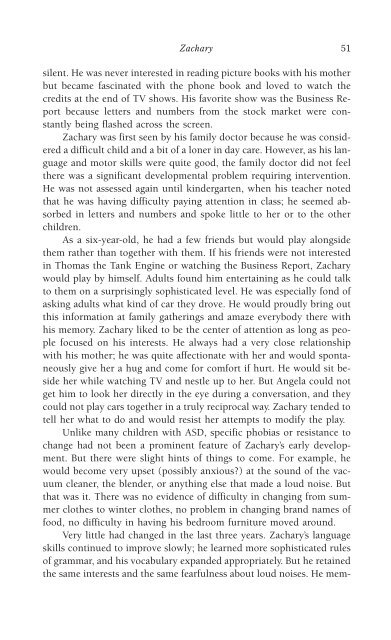978-1572305441
autism
autism
You also want an ePaper? Increase the reach of your titles
YUMPU automatically turns print PDFs into web optimized ePapers that Google loves.
Zachary 51<br />
silent. He was never interested in reading picture books with his mother<br />
but became fascinated with the phone book and loved to watch the<br />
credits at the end of TV shows. His favorite show was the Business Report<br />
because letters and numbers from the stock market were constantly<br />
being flashed across the screen.<br />
Zachary was first seen by his family doctor because he was considered<br />
a difficult child and a bit of a loner in day care. However, as his language<br />
and motor skills were quite good, the family doctor did not feel<br />
there was a significant developmental problem requiring intervention.<br />
He was not assessed again until kindergarten, when his teacher noted<br />
that he was having difficulty paying attention in class; he seemed absorbed<br />
in letters and numbers and spoke little to her or to the other<br />
children.<br />
As a six-year-old, he had a few friends but would play alongside<br />
them rather than together with them. If his friends were not interested<br />
in Thomas the Tank Engine or watching the Business Report, Zachary<br />
would play by himself. Adults found him entertaining as he could talk<br />
to them on a surprisingly sophisticated level. He was especially fond of<br />
asking adults what kind of car they drove. He would proudly bring out<br />
this information at family gatherings and amaze everybody there with<br />
his memory. Zachary liked to be the center of attention as long as people<br />
focused on his interests. He always had a very close relationship<br />
with his mother; he was quite affectionate with her and would spontaneously<br />
give her a hug and come for comfort if hurt. He would sit beside<br />
her while watching TV and nestle up to her. But Angela could not<br />
get him to look her directly in the eye during a conversation, and they<br />
could not play cars together in a truly reciprocal way. Zachary tended to<br />
tell her what to do and would resist her attempts to modify the play.<br />
Unlike many children with ASD, specific phobias or resistance to<br />
change had not been a prominent feature of Zachary’s early development.<br />
But there were slight hints of things to come. For example, he<br />
would become very upset (possibly anxious?) at the sound of the vacuum<br />
cleaner, the blender, or anything else that made a loud noise. But<br />
that was it. There was no evidence of difficulty in changing from summer<br />
clothes to winter clothes, no problem in changing brand names of<br />
food, no difficulty in having his bedroom furniture moved around.<br />
Very little had changed in the last three years. Zachary’s language<br />
skills continued to improve slowly; he learned more sophisticated rules<br />
of grammar, and his vocabulary expanded appropriately. But he retained<br />
the same interests and the same fearfulness about loud noises. He mem-



